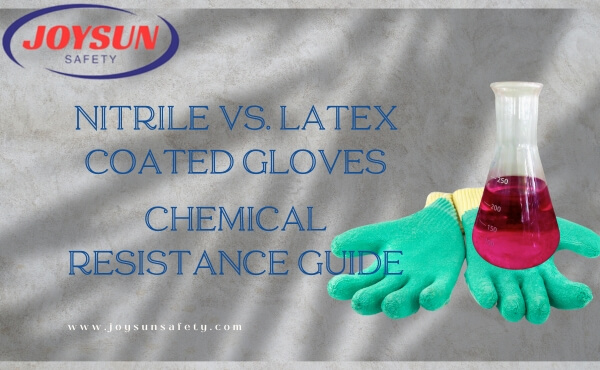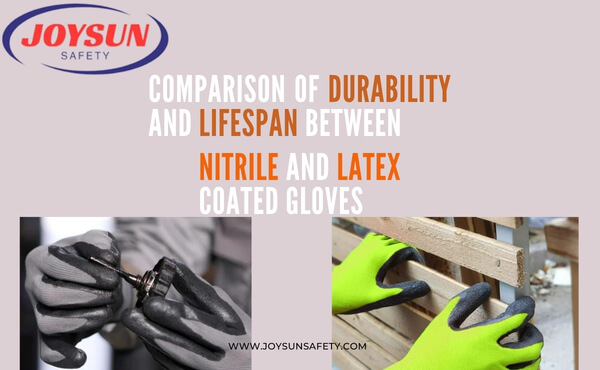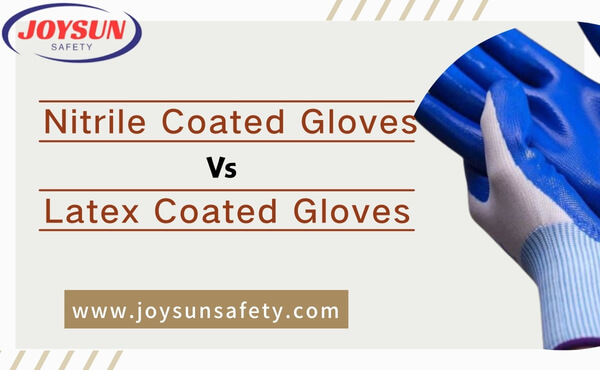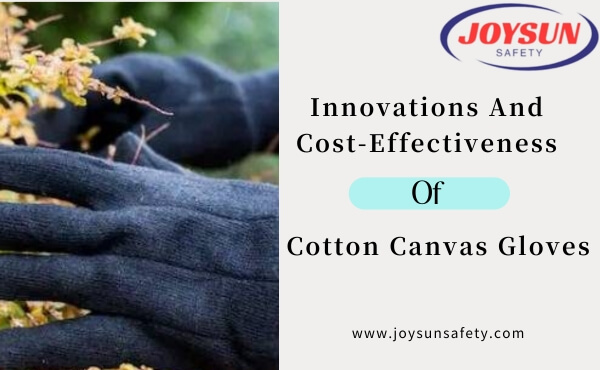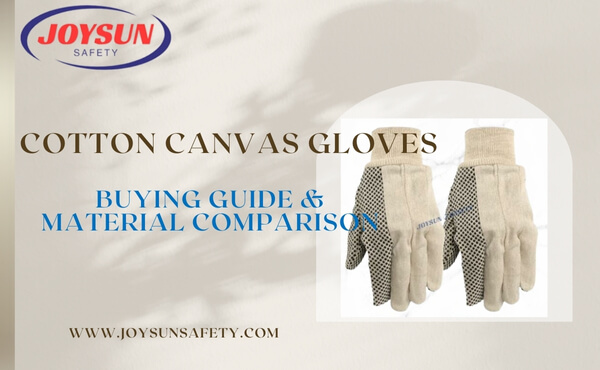How to Correctly Select a Pair of Nitrile Coated Work Gloves
Nitrile coated gloves are an essential piece of personal protective equipment (PPE) for various industries, offering protection against chemicals, abrasions, and other hazards encountered in the workplace. Selecting the right pair of gloves is crucial for both safety and comfort. In this article, Joysun Safety will delve deep into the world of nitrile coated gloves exploring material comparisons, characteristics, dipping process features, protection levels, technical specifications, proper wearing techniques, target user groups, functional applications, and glove care.
Material Comparison
Nitrile, a synthetic rubber material, is widely used in glove manufacturing due to its exceptional resistance to oils, fuels, and certain chemicals. Compared to natural rubber, nitrile offers superior chemical resistance and is less likely to cause allergic reactions. Additionally, nitrile gloves exhibit excellent tear and puncture resistance, making them ideal for demanding work environments.
When compared to other synthetic materials like vinyl, nitrile stands out for its durability and chemical resistance. Vinyl gloves, while cheaper, lack the durability and protection offered by nitrile, especially in industrial settings where exposure to chemicals and abrasions is high.
Characteristics of Nitrile Coated Gloves
- Chemical Resistance: Nitrile gloves provide excellent resistance to a wide range of chemicals, including oils, acids, alkalis, and solvents.
- Durability: These gloves are highly durable, offering good tear and abrasion resistance.
- Dexterity: The thin coating of nitrile allows for excellent dexterity and tactile sensitivity, essential for precision tasks.
- Allergen-Free: Nitrile is a synthetic material, reducing the risk of allergic reactions compared to natural rubber.
Dipping Process Features
The dipping process is a crucial step in the manufacture of nitrile coated gloves. This process involves dipping a glove liner (usually made of textile) into a liquid nitrile solution, which then forms a protective coating around the liner. The main features of this process include:
- Coating Thickness: The thickness of the nitrile coating can be adjusted during the dipping process, allowing for customization based on the required protection level and dexterity needs.
- Coating Uniformity: Advanced dipping techniques ensure a uniform coating of nitrile, providing consistent protection across the entire glove.
- Multiple Dipping: Some gloves undergo multiple dipping cycles to achieve a thicker, more durable coating.
Protection Levels
Nitrile coated gloves are available in different thicknesses and coatings, offering varying levels of protection:
- Light Duty: Thin coating for basic protection against dirt and grime, while maintaining excellent dexterity.
- Medium Duty: A balance between protection and dexterity, suitable for most industrial applications.
- Heavy Duty: Thick coating for maximum protection against abrasions and chemicals,sacrificing some flexibility.
Technical Specification Comparison
When selecting nitrile coated gloves, it’s important to consider the following technical specifications:
- Glove Thickness: Measured in millimeters, this affects the durability and dexterity of the glove.
- Glove Size: Ensuring a proper fit is crucial for comfort and protection.
- Coating Coverage: Full-hand, palm-coated, or 3/4-coated gloves offer different levels of protection based on the task.
- Chemical Resistance: Specific chemicals the glove can withstand.
- Cut Resistance Level: Measured on a scale, indicating the glove’s resistance to cuts and abrasions.
Wearing Nitrile Coated Gloves
Proper wearing technique is essential to ensure the gloves provide the intended protection:
- Choose the right size glove to ensure a snug fit.
- Inspect the gloves for any tears or damage before use.
- Pull the glove onto your hand, ensuring it covers the entire hand and wrist.
- Adjust the glove to eliminate any folds or wrinkles that could compromise protection.
Target User Groups
Nitrile coated gloves are suitable for a wide range of users, including:
- Industrial workers exposed to chemicals and abrasions.
- Mechanics and technicians working with grease and oil.
- Healthcare professionals requiring a higher level of chemical resistance than standard latex or vinyl gloves.
Functional Applications
Nitrile coated gloves are versatile and can be used in various applications:
- Chemical handling and disposal.
- Automotive repair and maintenance.
- General cleaning and janitorial work.
- Manufacturing and assembly lines.
Glove Care and Maintenance
Proper care and maintenance of gloves are crucial to ensure their longevity, effectiveness, and safety. Here are some guidelines for glove care and maintenance:
- Inspection: Regularly inspect gloves for any signs of wear and tear, such as rips, punctures, or thinning material. Damaged gloves should be discarded immediately to prevent exposure or contamination.
- Storage: Store gloves in a cool, dry place away from direct sunlight, heat, and chemicals. UV light and excessive heat can degrade the material, reducing the gloves’ protective properties.
- Cleaning: If gloves become contaminated, follow the manufacturer’s instructions for cleaning. Some gloves may be washed with soap and water, while others require specific cleaning agents. Always allow gloves to dry completely before reuse.
- Proper Use: Always wear the correct size of gloves to ensure a snug fit. Loose-fitting gloves can tear more easily and reduce dexterity. Additionally, avoid using gloves for tasks they are not designed for, as this can damage the material.
- Disposal: Dispose of gloves properly after use, especially if they have been in contact with hazardous materials. Follow local waste disposal regulations to ensure safety and environmental protection.
- Replacement: Gloves have a limited lifespan and should be replaced regularly, even if they show no visible signs of damage. Manufacturers often recommend replacing gloves after a certain period or number of uses.
By following these guidelines, you can ensure that your gloves remain effective and protect you from potential hazards. Remember, gloves are a critical component of personal protective equipment (PPE) and should be treated with care.



